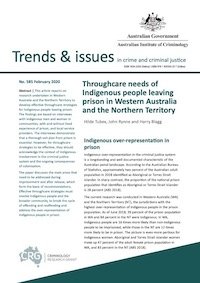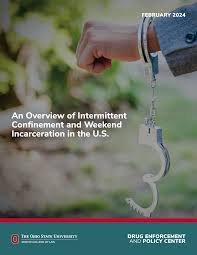By Hilde Tubex, John Rynne and Harry Blagg
This article reports on research undertaken in Western Australia and the Northern Territory to develop effective throughcare strategies for Indigenous people leaving prison. The findings are based on interviews with Indigenous men and women in communities, with and without lived experience of prison, and local service providers. The interviews demonstrate that a thorough exit plan from prison is essential. However, for throughcare strategies to be effective, they should acknowledge the context of Indigenous involvement in the criminal justice system and the ongoing consequences of colonisation. The paper discusses the main areas that need to be addressed during imprisonment and after release, which form the basis of recommendations. Effective throughcare strategies must involve Indigenous people and the broader community, to break the cycle of offending and reoffending and address the over-representation of Indigenous people in prison.
Trends & issues in crime and criminal justice no. 585. Canberra: Australian Institute of Criminology. 2020. 14p.



